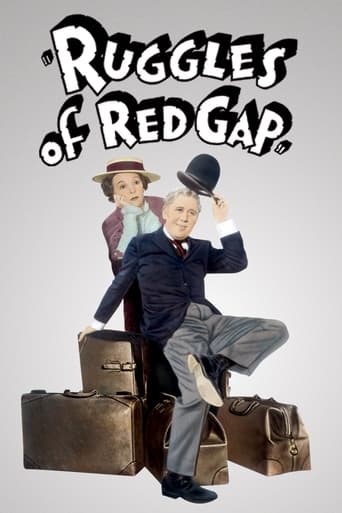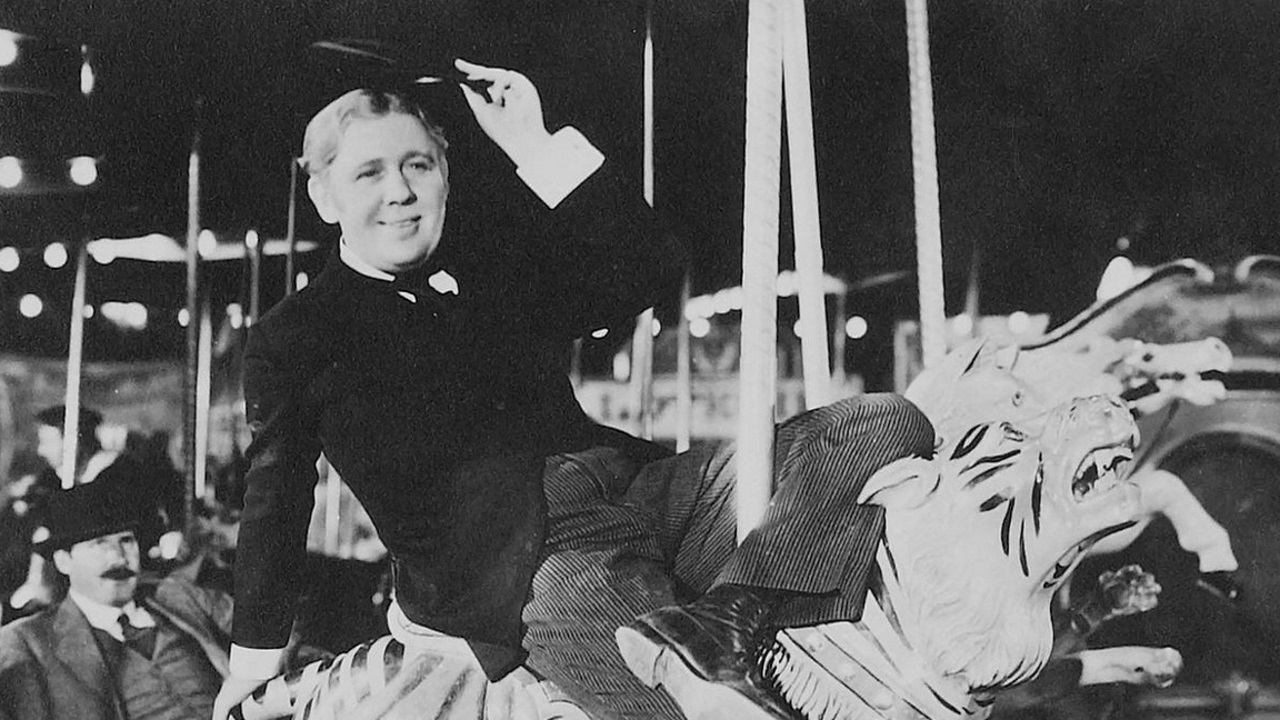vincentlynch-moonoi
I'm probably petty, but I find it difficult to enjoy films that star actors or actresses I really think I would intensely dislike. A good example of this is Charles Laughton. He's creepy. BUT...every once in a while a film of his will play on TCM and I will be transfixed by his performances -- "This Land Is Mine" and "The Paradine Case" being two examples. Now I must add another -- "Ruggles Of Red Gap". What a gem of a film, and what a gem of a performance by Laughton.This is a particularly good film for 3 reasons. First, a top-notch story. Second, a top-notch cast. Third, because it has as its underlying purpose a kudo to American democracy and individual freedom.In regard to the story, it's more than it might appear at first glance. First there's two very different characters -- a British manservant and an American cowboy-type, who each have to adjust to each other. You might say Bob Hope did that in one of his films. Yes, but there it was one man adjusting. Here, both very different men are adjusting to each other and to different worlds. And then it settles down into will a Brit be accepted in the American West? In regard to the cast, as already mentioned, Charles Laughton is magnificent here, and a semi-comedy is so much different for him. This is also an excellent part for Charles Ruggles; we often see him as sort of a mix between an uncouth cowboy and a man of some standing...not the sort of natty character he often portrayed. Mary Boland as his uppity wife did well, although her character is annoying. It was a pleasure to see the offbeat ZaSu Pitts in a bigger role than unusual, and as a love interest! Roland Young as a Brit...well, I never understood the attraction to him as an actor...and I still don't.In regard to the patriotic aspect of this story, there was a time when unbridled patriotism was something to be proud of it. And here a "foreigner" finds acceptance simply because he is what he is, not because of who he is. He is fascinated with Lincoln's Gettysburg Address, and spellbinds the patrons of a saloon by reciting it. And after all is said and done, the Brit becomes a jolly good fellow to the semi-cowboys of the town.It's difficult to find much to criticize here. But a lot to like. Highly recommended.
Scott44
Some pretty good reviews have been turned in so far. I recommend "All's Right With the World" (telegonus from brighton, ma; 16 August 2002). Also, jayjerry regards it as "My All-Time Favorite" (jayjerry from Burbank, CA; 2 February 2007).In "Making Your Way In A New World" (bkoganbing from Buffalo, New York; 6 October 2006) we get good background on Charles Laughton's personal interest in the story. In "For He's a Jolly Good Fellow" (lugonian from Kissimmee, Florida; 18 December 2010) we are provided the film history of the story.In "What did Lincoln say at Gettysburg, anyway?" (theowinthrop from United States; 20 May 2006) we get criticism of the pacing of some scenes, along with the gags that don't entirely work."Ruggles at Red Gap" starts out as a (not laugh-out loud) comedy about manners. As the story moves from Paris to the Western US, it acquires great depth by way of Laughton's extraordinary reciting of Abraham Lincoln's "Gettysburg Address" to a saloon filled with cowboys who can't recall a word of it.As freedom and liberation emerge as new themes, love also arrives. Laughton's Ruggles (convincing as a heterosexual) finds a widow (Zasu Pitts as Mrs. Judson) with whom a restaurant adventure is undertaken. Among the first patrons of this restaurant is his former Parisien employer (Roland Young as the Earl of Burnstead) who has found a very charming Washington socialite (Leila Hyams as Nell Kenner).Acquiring richness until the satisfying finale, "Ruggles at Red Gap" should be regarded as among the best films about Americana. Three scenes are standouts: Laughton's exceptional Gettysburgh recitation, Roland Young's musical flirting scene with Leila Hyams and the restaurant sequence climaxed by a rousing finish.Laughton's transformation from a dour and proper man servant to a more popular figure comes with the help of two instigators; i.e., wealthy ranchers Egbert (Charles Ruggels; yes that's confusing) and Effie Floud (Mary Boland). Egbert is a particularly corrupting influence on Ruggles by introducing him to drink and repeatedly insisting that they both share the same class.Each cast member is superb. Leo McCarey is very interesting visually. Note how in this cinematic period how few closeups there are; how often there seems to be a bit much space above characters heads and how far away a group stands from the viewer's perspective, as if seen from a stage.In real life in Washington State (around 1908) there probably would be more than one enemy for Ruggles to contend with; for being out of place, foppish, proper, literary and theatrical. As with many of the other films from the 1930s, common people are depicted idealistically.Somehow McCarey made this beautiful, rich and rewarding commentary about liberty, finding love and gaining acceptance before he appeared as a friendly witness to the House Committee on Un-American Activities (HUAC) witch hunt. This is not explained by "Ruggles."
kurosawakira
Leo McCarey's "Ruggles of Red Gap" (1935) is a fantastic comedy that has an expertly conceived, slowly unfolding narrative built above all things on the strength of the whole cast.The film largely revolves around the notion of opposites: overstated in gesture, understated in gesture; extrovert, introvert; brotherly intimacy, respectful distance. Laughton and Young abide always in the latter, Charles Ruggles (playing Egbert) and the rest of the Americans inhabit the former. All of these traits of characterization are then blown out of proportion, and both the comedy and underlying humanity is activated when these two extremes are first juxtaposed and then merged into one another: Ruggles' (not Charles but Laughton's character) drunkenness, the Earl's fascination with playing drums, and then the seminal moment toward the end where he quotes Lincoln. While it is Ruggles who's whipsawed by this cultural counterpoint the most, my favourite moments still go to the Earl, beautifully understated, and to Egbert, who is kindness and well-intentioned independence embodied.But this is so much more than just stereotype-floundered, exploitative farce. There's great humanity all around, and this balance is able to produce strong emotional responsiveness and identification either way – be it Egbert meeting his friend on the street in Europe, or Ruggles or the Earl refusing to open their social space. The characters are revealed as human and humane. Perhaps the payoff in the end rubs it a bit too much on my nose, but on the other and it's completely justified in the context of the film.
richard-1787
This isn't a great movie, but it is certainly an enjoyable one. An English gentleman's gentleman is taken to America when he's won in a game of cards by a wealthy American's husband. (No, that doesn't make any sense. A gentleman's gentleman isn't an indentured servant. You just have to buy the premise.) At first he is like a fish out of water. Eventually, he finds advantages and pleasure in what are touted as American virtues: all men are created equal, etc. Nothing profound, certainly, but the cast is uniformly good, as are their performances. Some, like Mary Boland's or Zsa Zu Pitt's, are yet another iteration of what they always played. Some, like Charlie Ruggles', are interesting exaggerations. The only performance I found strange was Charles Laughton's. He had a very strange way of showing what I suppose was meant to be seen as bewilderment.A pleasant way to spend 90 minutes.



 AD
AD



